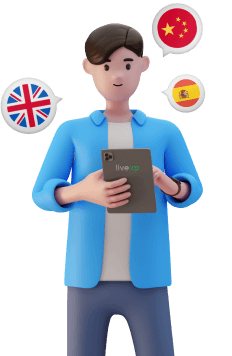
Common French Sayings for You to Use
With these few popular sayings in French and popular French phrases, you are sure you will maneuver your way around any situation that occurs during your trip.

Get a FREE guide!
Want to sound like a native English speaker?
Get our free PDF with top tips that work.

Check your email!
Taking a trip to France can be the most exhilarating experience; It’s a new city with new people and sights to see, and you might be thinking, “What could go wrong?”
Powerful French Phrases for Communication
Well, besides the fact that France is a beautiful city, commuting is not so easy, especially for travelers new to the country and its people. The most challenging thing about being a traveler commuting in France is the language barrier, especially if you are a non-French speaker. Even if your French speaking skills are average, you might find yourself in a situation where the people there may not speak English.
In situations like this, your best bet is to know a few popular sayings and common French phrases that will come in handy to you on the streets of France. And a few lessons with a native French speaker on LiveXP will help you learn and understand the most common and helpful phrases and use them in real-life conversations. Get ready for your trip to France with LiveXP!
Here are 10 French sayings and phrases that will be useful for you.
Useful French Sayings and Phrases to Know
Ravi(e) de faire votre connaissance
Literal meaning: “Happy to make your acquaintance.”
This is an expression used when you meet someone for the first time, and introductions have been made.
Comment allez-vous? (Formal) / comment ça va? (Informal)
Literal meaning: “How are you?”
Plus lentement, s’il vous plaît (Formal) / plus lentement, s’il te plait (Informal)
Literal meaning: “Can you say that slower, please?”
Je cherche
Meaning: “I’m looking for…”
This phrase is used if you are out shopping. You can easily add any clothing article you are looking for.
Je n’ai rien compris!
Literal meaning: “I did not understand anything.”
This phase should be used when you are in a conversation and can’t understand what the other party is saying, as they may be speaking too fast for you.
Ne laissez pas vos décisions au destin de décider
Literal meaning: “Do not leave your decisions for fate to decide.”
What it means: always plan for the future, as what happens is in your hands and should not be left to chance.
Using this saying in a sentence:
Pourquoi ne pas faire des plans adéquats ? Ainsi, nous ne laisserions rien au hasard.
Why don’t we make adequate plans? This way, we would leave nothing to the hands of chance.
Il vaut mieux être en retard que de ne jamais l’avoir fait
Literal translation: “It is better to be late than to have never do it.”
What it means: This saying is also common in the English language. It tells the listener that it is better to do something late than never to do it.
Using this in a sentence:
Ces missions ont depuis longtemps dépassé leurs dates de livraison, mais il vaut mieux tard que jamais pour le faire.
These assignments have long past their delivery dates; however, it is better late than never to get it done.
Les murs ont des oreilles
Literal transition: “The walls have ears.”
What it means: This is another common saying in English that requires one to pay close attention to their words as there is a chance that they might be overheard.
Using it in a sentence:
Faites attention à ce que vous dites, car les murs tels que vous les voyez ont des oreilles.
Be careful what you say, for the walls as you see them have ears.
Mieux vaut être seul que mal accompagné
Translation: “It is better being alone than it is being in the company of the bad.”
What it means: It is better to be on one’s own than to be in the midst of bad company.
Using it in a sentence:
Il vaut mieux être seul que d'être en mauvaise compagnie d'amis.
It is better to be alone than to be in a bad company of friends.
Literal translation: “Life is way too short for you to drink bad wine.”
What it means: This famous phrase is used both figuratively and literally in French and in English. It means life is too short to do what you don’t like.
Conclusion
With these few popular sayings in French and popular French phrases, you are sure you will maneuver your way around any situation that occurs during your trip.
















